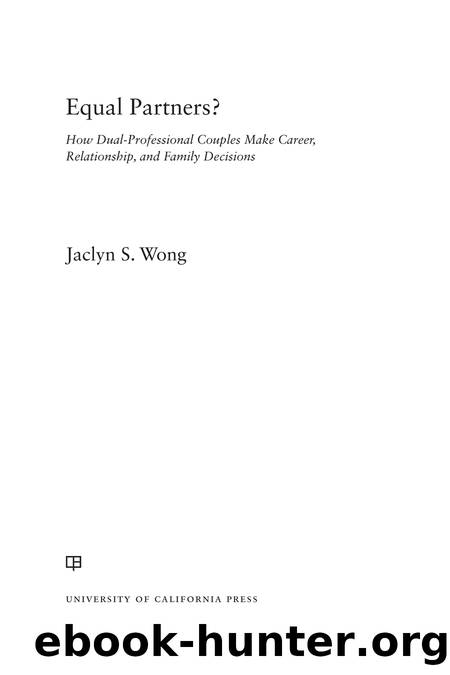Equal Partners? by Jaclyn S Wong

Author:Jaclyn S Wong
Language: eng
Format: epub
ISBN: 9780520384590
Publisher: University of California Press
[Then] we found out [I was pregnant].â¯.â¯.â¯. So that changed the way I was thinking about moving [to the West Coast]: the option of staying home and working from home became realistic. Financially it makes much more sense. In terms of the babyâs health, having someone at home makes much more sense. If I stay home and take care of the babyâI wouldnât have to get some kind of position to do the sort of research I like to do. I could stay at home, and instead of workingâ¯.â¯.â¯. I could work part-time on my [research].
Although at Time 1 Emily imagined working part-time as a new mother to âmaintain enough of a careerâ so she could later âgo back to full-time,â at Time 2 Emily insisted that full-time at-home motherhood was best âin terms of the babyâs health.â Despite feeling âreally uncomfortableâ about moving to a part of the country with few museums specializing in her research to support Bradâs continued job search, she argued that it was a rational financial decision for her to not work at all when their newborn arrived. Because existing frameworks for upper-middle-class working motherhood include working reduced hours independently from home while caring for children,22 Emily was able to envision a new arrangement for herself that supported Bradâs career, kept her (just barely) connected to her own career, and covered the partnersâ anticipated childcare needs. Womenâs pregnancies at Time 2, combined with menâs unemployment, amplified gender-traditional cultural frameworks that directed women toward a fully domestic role.
These cultural and interpersonal dynamics played out even when both partners of a tending traditional couple got jobs in their respective professional fields at Time 2. Men still emphasized the relative importance of their careers to them, so women gave up better opportunities for themselves to allow their partners to pursue the specific jobs they wanted. Liz, the data analyst who was completing an MPP, and her partner Hank, the finance professional, halted their joint job search by Time 2. Their vision of both transferring to their respective companiesâ East or West Coast offices to give Liz a chance to move up in her career would not become reality. In explaining what happened, Hank said, âThere are a lot of opportunities for me here. I want to stay. I think thatâs the best option.â Hank did not want to miss advancement opportunities with his current team. He further added, âWe have good jobs now,â to convince Liz that pursuing a more advanced role was unnecessary and that she could stay in her same position and negotiate a raise with her new degree.
Remember that these couples believed that being married (or in a marriage-like relationship) meant partners should trade off being the career leader. This understanding of commitment led tending traditional women to give men âtheir turnâ to have the focal career at Time 2. As Hankâs preference to continue working in his current finance office grew more pronounced over time, Liz worked to change her feelings about the importance
Download
This site does not store any files on its server. We only index and link to content provided by other sites. Please contact the content providers to delete copyright contents if any and email us, we'll remove relevant links or contents immediately.
Nudge - Improving Decisions about Health, Wealth, and Happiness by Thaler Sunstein(7706)
The Fire Next Time by James Baldwin(5444)
iGen by Jean M. Twenge(5415)
Adulting by Kelly Williams Brown(4574)
The Sports Rules Book by Human Kinetics(4386)
The Hacking of the American Mind by Robert H. Lustig(4383)
The Ethical Slut by Janet W. Hardy(4251)
Captivate by Vanessa Van Edwards(3839)
Mummy Knew by Lisa James(3691)
In a Sunburned Country by Bill Bryson(3542)
The Worm at the Core by Sheldon Solomon(3487)
Ants Among Elephants by Sujatha Gidla(3467)
The 48 laws of power by Robert Greene & Joost Elffers(3291)
Suicide: A Study in Sociology by Emile Durkheim(3022)
The Slow Fix: Solve Problems, Work Smarter, and Live Better In a World Addicted to Speed by Carl Honore(3009)
The Tipping Point by Malcolm Gladwell(2921)
Humans of New York by Brandon Stanton(2873)
Get What's Yours for Medicare: Maximize Your Coverage, Minimize Your Costs by Philip Moeller(2730)
Handbook of Forensic Sociology and Psychology by Stephen J. Morewitz & Mark L. Goldstein(2705)
